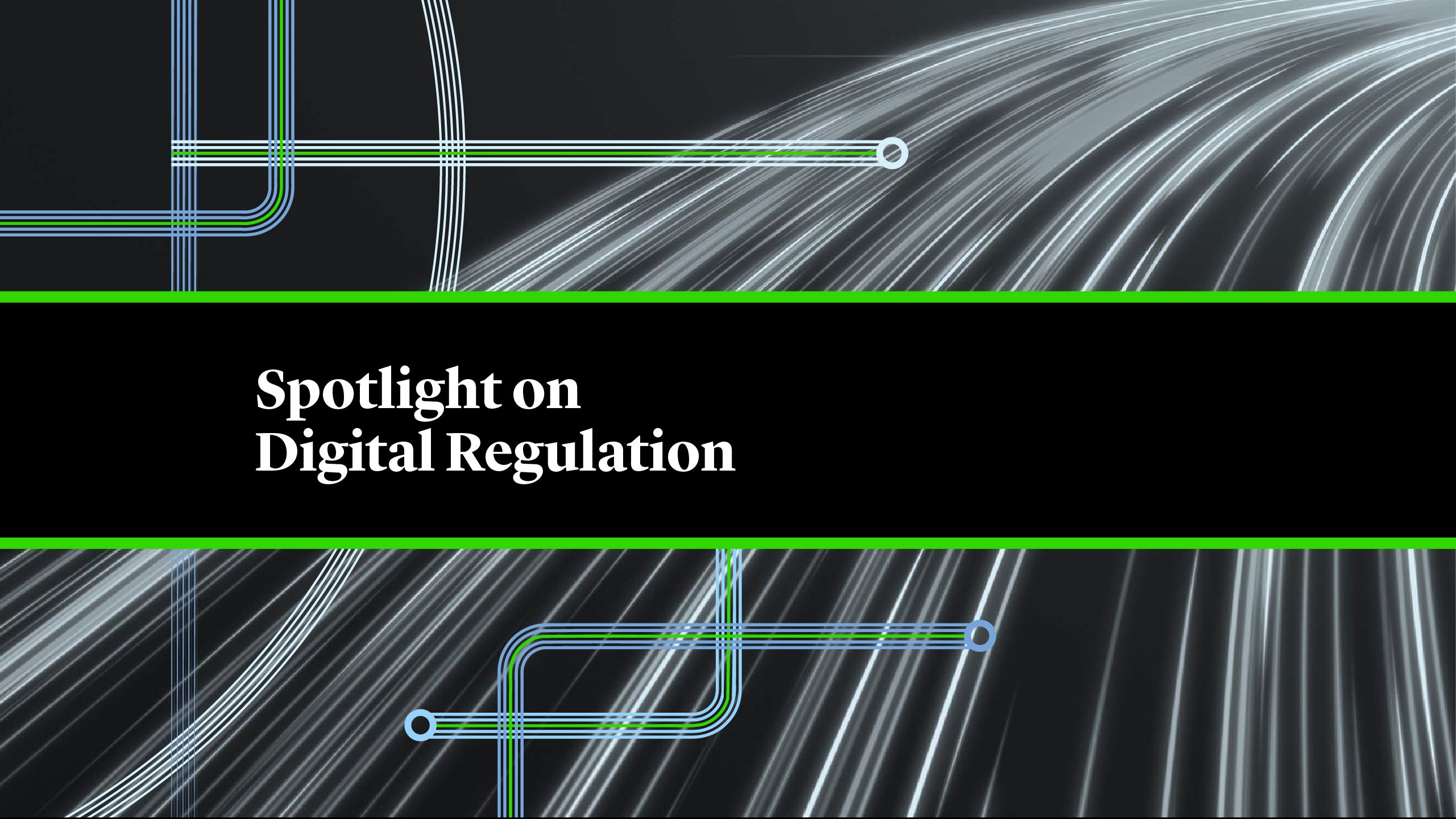
The last decade has seen enforcers, courts, practitioners, and academics grapple with the application of antitrust rules to digital markets. Although agencies around the world have intervened to challenge an array of practices, some have questioned whether pursuing individual cases based on existing rules can effectively address in a timely manner the range of issues that the agencies have identified. In response, significant legislation is being implemented in a number of jurisdictions to expand enforcers’ tool boxes by creating new rules and enforcement mechanisms for digital markets. These new laws are often referred to as “digital regulations.”
The most advanced of these regulations is the EU’s Digital Markets Act (the DMA), which will shortly enter into force. The DMA codifies the EU’s jurisprudence, reflecting existing antitrust policies and theories, and introduces sweeping new enforcement powers that are designed to have a transformative effect on digital markets. Beyond the DMA, other legislative efforts include the EU’s Digital Services Act (the DSA), which regulates the content businesses host online; new rules enacted by individual EU Member States, including Section 19 of Germany’s revised competition law; the UK’s proposed Digital Markets, Competition and Consumer Bill; as well as significant proposals for new laws in the U.S. and elsewhere.
The far-reaching impact of these regulations makes it critical for companies active in digital markets to stay abreast of legislative developments, and regulators' guidance, thinking, and enforcement activity. The number and complexity of the rules make this challenging. These regular posts from Cleary Gottlieb’s Digital Regulation team are designed to keep you updated on developments in digital regulation, including through actionable insights on:


The most advanced of these regulations is the EU’s Digital Markets Act (the DMA), which will shortly enter into force. The DMA codifies the EU’s jurisprudence, reflecting existing antitrust policies and theories, and introduces sweeping new enforcement powers that are designed to have a transformative effect on digital markets. Beyond the DMA, other legislative efforts include the EU’s Digital Services Act (the DSA), which regulates the content businesses host online; new rules enacted by individual EU Member States, including Section 19 of Germany’s revised competition law; the UK’s proposed Digital Markets, Competition and Consumer Bill; as well as significant proposals for new laws in the U.S. and elsewhere.
The far-reaching impact of these regulations makes it critical for companies active in digital markets to stay abreast of legislative developments, and regulators' guidance, thinking, and enforcement activity. The number and complexity of the rules make this challenging. These regular posts from Cleary Gottlieb’s Digital Regulation team are designed to keep you updated on developments in digital regulation, including through actionable insights on:
What companies will be subject to the new rules?
While some regulations are tailored to apply only to the world's leading digital platforms, others have a wider ambit, and some regulations’ precise scope is still being debated. Companies active in digital markets will need to understand the detail of the evolving qualitative and quantitative tests to determine which regulations they may be in scope of.
What practices will be impacted?
The rules broadly reflect existing antitrust policies and theories. Several obligations that appear in legislative proposals across jurisdictions are directly inspired by previous antitrust cases. But some regulations – such as the DMA – ban certain categories of conduct outright without requiring enforcers to show that the conduct was capable of harming competition. This approach leaves little room for companies to justify their activities by showing benefits to consumers. A clear understanding of the conduct in scope of the law is therefore critical.
Who will enforce these regulations?
In recognition of the regulations’ antitrust heritage, most jurisdictions are allocating enforcement responsibility to dedicated teams within existing competition authorities. Some regulations – such as the DSA – will, however, be supervised by enforcers with previous regulatory expertise in the digital sector; while others – such as the DMA – will be overseen by teams that combine both antitrust and digital regulatory expertise. The background and policy priorities of the authorities responsible for enforcement will provide indications as to the likely interpretation of the new rules and the types of evidence that may be effective when interacting with a given authority.
Whether these regulations will accomplish their goals.
Many of the new laws have similar goals, which implies that a coherent, global approach to compliance could emerge. But this outcome is far from certain. The drafts of certain laws diverge, for instance, as to which companies are in scope, how the rules are articulated, and what services the rules apply to. And the authorities responsible for enforcing the regulations will have different policy goals and priorities.
- What companies will be subject to the new rules? While some regulations are tailored to apply only to the world's leading digital platforms, others have a wider ambit, and some regulations’ precise scope is still being debated. Companies active in digital markets will need to understand the detail of the evolving qualitative and quantitative tests to determine which regulations they may be in scope of.
- What practices will be impacted? The rules broadly reflect existing antitrust policies and theories. Several obligations that appear in legislative proposals across jurisdictions are directly inspired by previous antitrust cases. But some regulations – such as the DMA – ban certain categories of conduct outright without requiring enforcers to show that the conduct was capable of harming competition. This approach leaves little room for companies to justify their activities by showing benefits to consumers. A clear understanding of the conduct in scope of the laws is therefore critical.
- Who will enforce these regulations? In recognition of the regulations’ antitrust heritage, most jurisdictions are allocating enforcement responsibility to dedicated teams within existing competition authorities. Some regulations – such as the DSA – will, however, be supervised by enforcers with previous regulatory expertise in the digital sector; while others – such as the DMA – will be overseen by teams that combine both antitrust and digital regulatory expertise. The background and policy priorities of the authorities responsible for enforcement will provide indications as to the likely interpretation of the new rules and the types of evidence that may be effective when interacting with a given authority.
- Whether these regulations will accomplish their goals. Many of the new laws have similar goals, which implies that a coherent, global approach to compliance could emerge. But this outcome is far from certain. The drafts of certain laws diverge, for instance, as to which companies are in scope, how the rules are articulated, and what services the rules apply to. And the authorities responsible for enforcing the regulations will have different policy goals and priorities.

Further legislative developments and initial interactions with enforcers will refine the answers to these and other questions that will determine the impact of these rules on digital markets. All companies affected by these laws will want to keep up with these developments in this complex and fast-moving space. This regular update is designed to help them do so.
Nicholas Levy
London
T: +44 20 7614 2243
Brussels
T: +32 2 287 2311
nlevy@cgsh.com
V-Card
Leah Brannon
Washington, D.C.
T: +1 202 974 1508
lbrannon@cgsh.com
V-Card
Henry Mostyn
London
T: +44 20 7614 2241
hmostyn@cgsh.com
V-Card
Conor Opdebeeck‑Wilson





